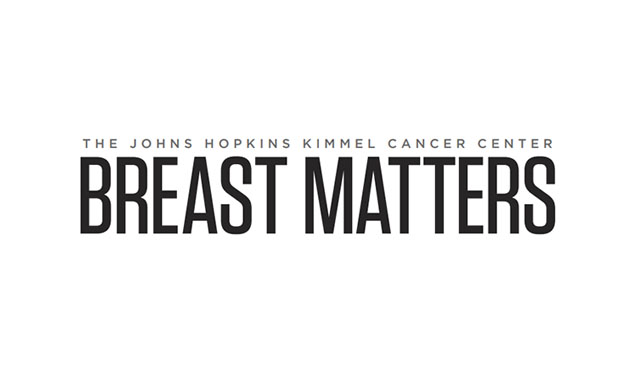Publications
Choose from Over 30 Publications. Find the latest in patient care, surgery, biomedical research and alumni news.
publications A-H
-
Aequanimitas
News for current and former residents of the Department of Medicine's Osler Medical Service

-
Brainwise
News from the Department of Psychiatry and Behavioral Sciences, featuring clinical advances of interest to referring physicians.

-
Breast Matters
A publication of the Breast Cancer Program at the Johns Hopkins Sidney Kimmel Comprehensive Cancer Center.

-
Cardiovascular Report
News from the Johns Hopkins Heart and Vascular Institute, featuring clinical and research advances of interest to referring physicians.

-
Discovery Newsletter
A publication from Hopkins' James Buchanan Brady Urological Institute.

-
Dome
News for faculty and staff members at all Johns Hopkins Medicine member organizations.

-
Esophageal Cancer Matters
A publication by the Esophageal Cancer Program at the Johns Hopkins Kimmel Cancer Center.

-
Framework
Profiles of donors and news of the programs they support for friends of the Department of Orthopedic Surgery.

-
Fundamentals
The Fundamentals e-Newsletter delivers the latest news in basic, preclinical and translational research at the Johns Hopkins School of Medicine.

-
Greater Washington Area
News from Suburban Hospital and Sibley Memorial Hospital, part of Johns Hopkins Medicine.

-
Gynecology and Obstetrics
News from the Johns Hopkins Department of Gynecology and Obstetrics, featuring clinical and research advances of interest to referring physicians.

-
Headway
News from the Department of Otolaryngology-Head and Neck Surgery, featuring clinical and research advances of interest to referring physicians.

-
Hopkins Children's
Written for donors, patients and their families, pediatric health professionals and the general public, this four-color magazine covers in depth the latest breakthroughs in

-
Hopkins Medicine Magazine
The alumni magazine for graduates and friends of the Johns Hopkins University School of Medicine.

publications I-P
-
Inside Tract
News from the Division of Gastroenterology and Hepatology, featuring clinical and research advances of interest to referring physicians.

-
Insight
News of innovative solutions and technology at Johns Hopkins Medicine.

-
NeuroLogic
News from the departments of Neurology and Neurosurgery, featuring clinical and research advances of intrest to referring physicians.

-
On Alert
Johns Hopkins CEPAR develops a quarterly newsletter highlighting news and information relating to emergency preparedness and CEPAR.

-
One Wilmer
News about the patient care, research, and teaching missions of the multiple division of the Wilmer Eye Institute.

-
Orthopaedic Surgery
News from the Department of Orthopaedic Surgery, featuring clinical and research advances of interest to referring physicians.

-
Pediatrician
Written for community pediatricians and their patients and families, this six-page, four-color newsletter focuses on the latest clinical research and best practices in pediatrics.

-
Promise & Progress
The magazine of the Sidney Kimmel Comprehensive Cancer Center at Johns Hopkins.

publications Q-X
-
Radiology Update
News and updates from the Russell H. Morgan Department of Radiology and Radiological Science.

-
Restore
News from the Department of Physical Medicine and Rehabilitation, featuring clinical and research advances of interest to referring physicians.

-
Surgery
News from the Department of Surgery, featuring clinical and research advances of interest to referring physicians.

-
Wilmer
Profiles of donors and news of the programs they support for friends of the Wilmer Eye Institute.

